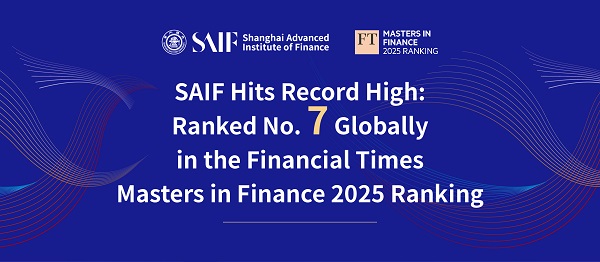The Shanghai Advanced Institute of Finance (SAIF) at Shanghai Jiao Tong University reached a significant milestone on June 16, 2025, when its Master of Finance (MF) Program secured the No. 7 position globally in the Financial Times Masters in Finance 2025 Ranking. This achievement marks the program's second consecutive year in the world's top 10, cementing SAIF's reputation as a premier provider of finance education.

The Financial Times Masters in Finance Ranking, established in 2011, represents one of the most prestigious and influential evaluations in graduate finance education worldwide. This year's comprehensive assessment evaluated 70 leading business schools across three critical dimensions: Alumni Career Progress, School Diversity— and International Experience, Research and Carbon Footprint.
SAIF's MF Program has consistently demonstrated excellence, maintaining its No. 1 position in Asia for three consecutive years while achieving top-10 global status for the third time. The program showcased exceptional performance across multiple key metrics, including second place globally in "Careers Service" (first in Asia), third place globally in both "Salary Today" and "Course Value for Money," while maintaining perfect 100% scores in "Employment Rate at Three Months" and "Faculty with Doctorates."
Professor Shijun Cheng, Executive Dean and Chair Professor of Accounting at SAIF, reflected on this achievement: "The MF program's success validates SAIF's commitment to high-quality development and our dedication to an internationalized, specialized, and market-oriented approach with Chinese characteristics over the past 16 years. Moving forward, we remain committed to our founding mission of becoming a world-class finance education institution, advancing both talent development and academic excellence while contributing to Shanghai's emergence as a leading international financial center."
Since its launch in 2009, SAIF's flagship MF program has consistently focused on developing future finance leaders. The program offers two specialized tracks—MF-General and MF-FinTech—delivered through a comprehensive two-year, full-time English curriculum that integrates global industry developments with world-class faculty expertise, international teaching methodologies, and extensive industry engagement. The program maintains strategic collaborations with prestigious international institutions through diverse academic modules and dual-degree opportunities, including partnerships with Columbia University, University of California at Berkeley, London School of Economics and Political Science, Imperial College London, Bocconi University, and Singapore Management University. These partnerships ensure students gain exposure to the latest financial innovations and research while developing global perspectives and expanding professional networks.
The SAIF Career Development Center (CDC) drives exceptional outcomes through a forward-thinking professional ecosystem that integrates emerging technology trends, personalized advisory services, and deep industry insights. Supported by experienced global advisors and advanced analytical tools, the CDC provides tailored guidance to maximize student potential while continuously adapting services to align with evolving market demands and national development priorities. This comprehensive career support system significantly contributes to SAIF MF's outstanding FT ranking performance: 100% employment within three months, with globally competitive rankings in career services, salary competitiveness, and alumni career progression.
The MF program has established itself as a benchmark in Asia and globally, recognized for its innovative curriculum, internationally-oriented teaching framework, and deep industry integration. The program attracts exceptional students from around the world, with 85% of mainland Chinese candidates coming from China's most prestigious universities—Tsinghua University, Peking University, Shanghai Jiao Tong University, and Fudan University—alongside outstanding students from Hong Kong, Macau, Taiwan, and other regions including Europe, North America, and beyond.
As China undergoes significant economic transformation, the MF program continues developing next-generation global financial leaders. Professor David X. Li, Academic Director of the MF program, emphasized: "The financial industry faces unprecedented transformation, requiring professionals skilled in emerging financial tools, artificial intelligence integration, and innovative corporate solutions. We develop versatile talent with professional expertise, strategic thinking, and global awareness, supported by cutting-edge curriculum, world-class faculty, and personalized career guidance. This recognition underscores our commitment to excellence and our vital role in advancing China's financial sector."
Founded by the Shanghai Municipal People's Government and based at Shanghai Jiao Tong University, SAIF is dedicated to achieving world-class status within China's educational landscape. Since 2009, SAIF has focused on cultivating exceptional finance talent, fostering innovative research platforms, and serving as a leading think tank. As one of the world's youngest AACSB-accredited business schools, SAIF delivers a comprehensive program portfolio—including MF, Finance MBA, EMBA, PhD, GES, and Executive Education—continuously innovating to meet evolving market demands.
Beyond talent cultivation, SAIF collaborates with its affiliated research institutions—the China Academy of Financial Research (CAFR) and Shanghai Advanced Institute for Financial Research (SAIFR)—forming the SAIF ThinkTank. This integrated platform supports government and industry through rigorous academic, policy, and applied research initiatives. Prioritizing Technological Innovation Finance, Digital Finance, and Sustainable Finance, SAIF strengthens the integration of finance and technology to promote sustainable development, supporting China's financial industry advancement, Shanghai's "Five Centers" initiative, and Shanghai Jiao Tong University's world-class institutional objectives.






